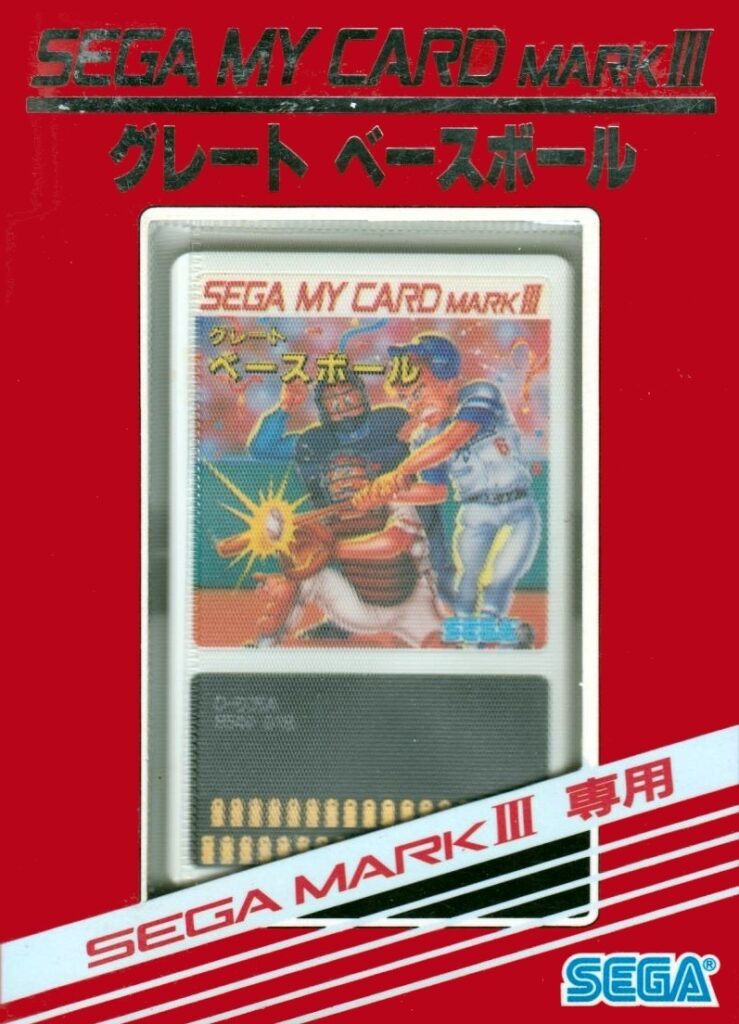
PLAYERS: 1-2 simultaneous
PUBLISHER/DEVELOPER: Sega
GENRE: Sports
RELEASE DATE: 12/15/85 – (JP)
If imitation is the sincerest form of flattery, Sega’s Great Baseball worships at an altar dedicated to Nintendo’s Baseball. Save for slightly better graphics and speedier gameplay in the former, the two titles couldn’t be more alike in style, play, and sound. As one of the few fans of Baseball, I believe that the similarities between games are a good thing; certainly Great Baseball is an improvement over whatever Champion Baseball was trying to achieve. But the fact remains that Sega could have gotten into a lot of legal trouble with Great Baseball – assuming Nintendo knew of the game’s existence in the first place.
Anyone who has wrestled with Nintendo’s Baseball probably recalls cheap AI, incompetent in/outfielders who can’t catch or throw to the proper base, and fouls aplenty. Great Baseball refines these quirks/flaws into near perfection – for an early baseball game devoid of options or stats, anyway. AI is tough, but fair, the in/outfielders can both catch and throw to the appropriate base, and fouls? Well, there’s still plenty of fouls, but they feel like a result of your poor batting stance rather than the game’s error. The baseball players too are more colorful and detailed than the blocky sprites of Baseball. Otherwise – and I can’t stress this enough – every feature is the same: from the placement of the score box, to the way the pitchers stand before throwing the ball, to the flashing “Home Run” letters. Great Baseball is Baseball in HD after a couple Red Bulls.
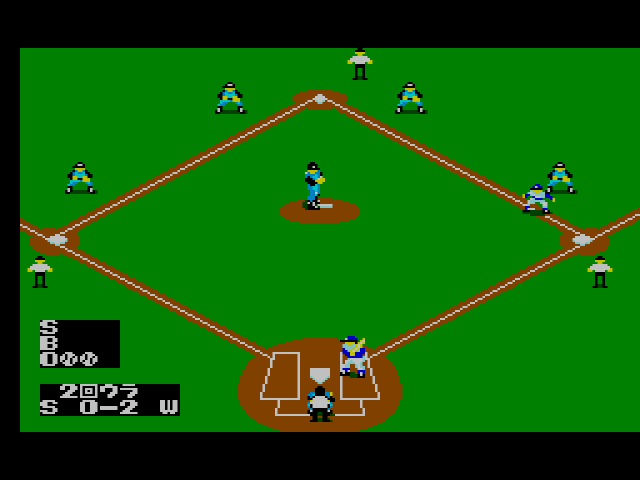
Great Baseball does add a difficulty selection option on the main menu for both one and two-players, and a Home Run Contest. In the latter, you try to get as many home runs as possible – up to twenty hits or misses. The computer controls the pitches, but never deviates from a down-the-center, straight-and-true pitch. Thus, it’s pretty easy to rack up the home runs if you know the right time to swing. An all-around interesting diversion for about five minutes, but acquiring home run after home run doesn’t have the same feel unless you’re actually playing a game.
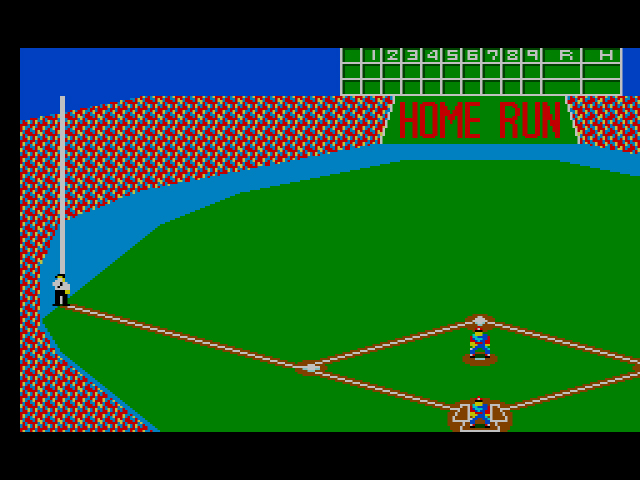
Speculation time: Sega could have gotten away with copying Baseball because, at the time of Great Baseball‘s release, Nintendo was focused on marketing and distributing the first waves of NES’ in the United States and likely not giving a damn about a new Sega system in Japan. Or perhaps Nintendo noticed a couple years later? When Great Baseball was released in the US and Europe in 1987, it was a completely different game, though both versions were developed by Sega. Perhaps Sega didn’t want to push their luck with Nintendo by releasing the Mark III version in different territories, or perhaps the Mark III version was just feeling dated two years after its release.
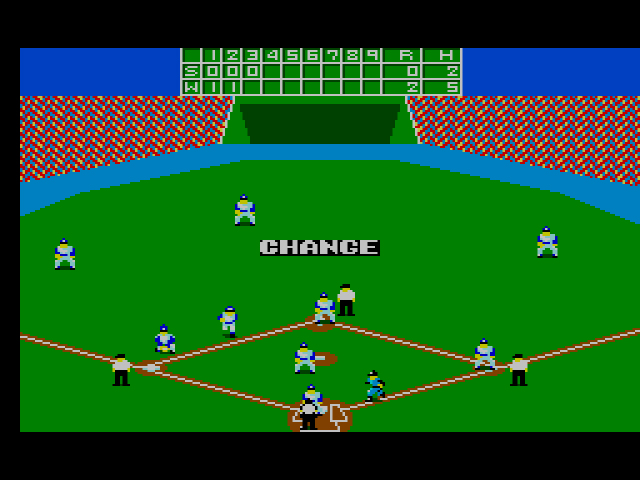
Any gaming superheroes that have any ideas as to how Sega evaded a lengthy court case with Great Baseball, please leave them in the comments section. Lest we forget (and just in case I have any young’uns in the audience), Sega and Nintendo were honest-to-God rivals back in the day – or at least, in ’85, Sega was desperately hoping they would be. Great Baseball could be seen as Sega’s pitiful plea to Nintendo. “Notice us! Appreciate us! Look, we made your Baseball game better!” And they did. By using Baseball as a template, Great Baseball became their greatest sports game to date, precisely because it doesn’t play like crap their other sports games.
Stealing is wrong.
B+

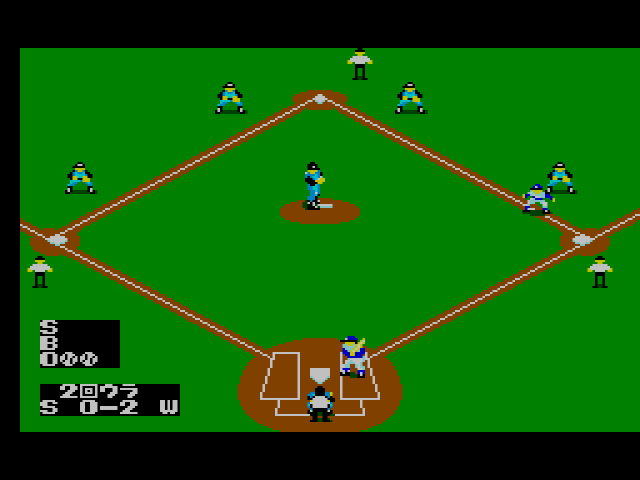
3 replies on “Great Baseball (Mark III, 1985)”
Wow. I was scrolling down this article to check the rating first (it’s just what I do) but I had to scroll back up again to check I was on the right website when I suddenly saw screenshots of NES Baseball.
I’ve got two unfounded, wildly speculative theories as to why there was no court case:
1) in 1985, I’m pretty sure hardware was king in the tech world. Until Microsoft hit the jackpot with Windows 3 in 1990 that software-based patent wars really started to pick up and become commonplace (at least in the US – not sure about Japan).
2) given the year, it’s entirely possible Nintendo America execs just didn’t know. This is a time where the fastest mode of communication would have been a horrendously expensive phone call – I’m tipping a Japanese-only release of a baseball game simply wouldn’t have been important enough to make the agenda.
And I really doubt that Great Baseball was that popular… I mean, maybe it was to Sega diehards, but Famicom loyals probably weren’t aware of the game’s existence.